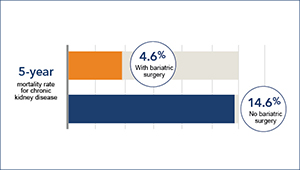Obesity
Research overview
“Obesity is the number-one health problem in the United States because it negatively affects our population’s health more than any other condition,” said Kaiser Permanente Washington Health Research Institute Senior Investigator David Arterburn, MD, MPH. Kaiser Permanente Washington researchers are doing practical research to learn how doctors, patients, families, employers, and policymakers can best work together to prevent and treat obesity.
“We’re focusing on three ways to halt the obesity epidemic,” said Senior Investigator Dori Rosenberg, PhD, MPH. “We’re helping to change obesity-promoting environments, bringing evidence-based prevention and treatment programs into health care systems, and helping people develop lifelong healthy diet and activity habits.”
Kaiser Permanente Washington obesity research areas include:
- reducing sedentary behavior and promoting physical activity and healthy diet in various age groups, populations with chronic conditions, and families;
- shared decision making to help patients find the best way to a healthy weight;
- implementing health coaches in primary care to support behavior changes;
- social networks that support lifestyle change programs;
- relationships between medications and genetic factors in developing obesity;
- health system, community, and national policies that address obesity;
- relationships between obesity and depression, diabetes, and other conditions; and
- long-term benefits and risks of bariatric (weight loss) surgery.
“Obesity is caused by many factors, so at Kaiser Permanente Washington, we’re working on many levels,” said Paula Lozano, MD, MPH, a senior investigator and Kaiser Permanente Washington’s assistant medical director for preventive care. “We’re improving health care to help people who are obese now. But since obesity is a societal problem, we’re also studying how to change our homes and workplaces and neighborhoods to create more healthy environments.”
Recent publications on Obesity
Fisher DP, Johnson E, Haneuse S, Arterburn D, Coleman KJ, O'Connor PJ, O'Brien R, Bogart A, Theis MK, Anau J, Schroeder EB, Sidney S Association Between Bariatric Surgery and Macrovascular Disease Outcomes in Patients With Type 2 Diabetes and Severe Obesity 2018 Oct 16;320(15):1570-1582. doi: 10.1001/jama.2018.14619. PubMed
US Preventive Services Task Force, Curry SJ, Krist AH, Owens DK, Barry MJ, Caughey AB, Davidson KW, Doubeni CA, Epling JW, Grossman DC, Kemper AR, Kubik M, Landefeld CS, Mangione CM, Phipps MG, Silverstein M, Simon MA, Tseng CW, Wong JB Behavioral Weight Loss Interventions to Prevent Obesity-Related Morbidity and Mortality in Adults: US Preventive Services Task Force Recommendation Statement 2018 Sep 18;320(11):1163-1171. doi: 10.1001/jama.2018.13022. PubMed
O'Brien R, Johnson E, Haneuse S, Coleman KJ, O'Connor PJ, Fisher DP, Sidney S, Bogart A, Theis MK, Anau J, Schroeder EB, Arterburn D Microvascular Outcomes in Patients With Diabetes After Bariatric Surgery Versus Usual Care: A Matched Cohort Study 2018 Sep 4;169(5):300-310. doi: 10.7326/M17-2383. Epub 2018-08-07. PubMed
Inge TH, Coley RY, Bazzano LA, Xanthakos SA, McTigue K, Arterburn D, Williams N, Wellman R, Coleman KJ, Courcoulas A, Desai NK, Anau J, Pardee R, Toh S, Janning C, Cook A, Sturtevant J, Horgan C, Zebrick AJ, Michalsky M, PCORnet Bariatric Study Collaborative Comparative effectiveness of bariatric procedures among adolescents: the PCORnet bariatric study 2018 Sep;14(9):1374-1386. doi: 10.1016/j.soard.2018.04.002. Epub 2018-04-17. PubMed
Kim DD, Arterburn DE, Sullivan SD, Basu A Economic Value of Greater Access to Bariatric Procedures for Patients With Severe Obesity and Diabetes 2018 Jul;56(7):583-588. doi: 10.1097/MLR.0000000000000924. PubMed
Researchers in Obesity
 David E. Arterburn, MD, MPHSenior Investigator |
 Allen Cheadle, PhDSenior Investigator, KPWHRI; Senior Research Associate, CCHE |
 Andrea J. Cook, PhDSenior Biostatistics Investigator |
 Maricela Cruz, PhDAssociate Biostatistics Investigator |
 Nicole M. Gatto, PhD, MPHPrincipal Collaborative Scientist |
 Beverly B. Green, MD, MPHSenior Investigator |
 Mikael Anne Greenwood-Hickman, MPHSenior Collaborative Scientist |
 Paula Lozano, MD, MPHSenior Investigator; Director, ACT Center |
 Dori E. Rosenberg, PhD, MPHSenior Investigator |
 Gregory E. Simon, MD, MPHSenior Investigator |











